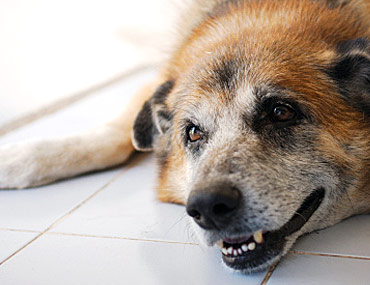Overview
Myasthenia gravis is a disorder affecting our canine friends. It is caused by a breakdown of the transmission of impulses from the nerves to the muscles. This keeps the muscles from contracting, causing affected dogs to become weak—the number one symptom of this neuromuscular disease.
Risk
Though rare, myasthenia gravis can be an inherited congenital defect that pups are born with. Some breeds at risk for the congenital form are Jack Russell terriers, springer spaniels, and smooth fox terriers. More commonly, myasthenia gravis is an acquired problem in adult dogs that is thought to be the result of a defect in a dog’s immune system caused by antibodies that mistake the dog’s muscle receptors as “bad guys,” attacking them and preventing them from working properly.
 Both female and male dogs are equally at risk, and all breeds are susceptible to this disease. Dogs that acquire mild forms of this disease later in life have a fairly good prognosis, so long as they receive proper, timely treatment.
Both female and male dogs are equally at risk, and all breeds are susceptible to this disease. Dogs that acquire mild forms of this disease later in life have a fairly good prognosis, so long as they receive proper, timely treatment.
Symptoms
Symptoms of myasthenia gravis can vary greatly from dog to dog. The most common symptom is muscle weakness that worsens with exercise but improves with rest. Often the esophagus is affected, and dogs have trouble swallowing and drinking. They may also regurgitate food. In some situations, affected dogs aspirate food and water, which can result in pneumonia.
Diagnosis
If your pet suffers from muscle weakness, your veterinarian will take a thorough history and perform a complete physical exam on him.
There are many things that can cause muscle weakness in dogs; therefore, your veterinarian may recommend diagnostic tests such as:
- Chemistry tests to evaluate kidney, liver, and pancreatic function, as well as sugar levels
- Blood parasite screening to identify if your pet has been exposed to tick-borne or other infectious diseases
- Fecal tests to rule out intestinal parasites
- A complete blood count (CBC) to rule out blood-related conditions
- Electrolyte tests to ensure your pet isn’t dehydrated or suffering from an electrolyte imbalance
- Urine tests to screen for urinary tract infections and other diseases, and to evaluate the kidney’s ability to concentrate urine
- A thyroid test to determine if the thyroid gland is producing too little thyroid hormone
- X-rays of the chest, abdomen, and spine
- Myelogram contrast x-rays of the spine (dye is injected into the spinal column, then x-rayed)
- MRI or CT scan to gain a detailed picture of the brain and spine
- Specialized immunologic tests, including titers
- A Tensilon test, which checks muscle response
Treatment
If your four-legged friend is diagnosed with myasthenia gravis, your veterinarian will tailor your dog’s treatment specifically to his needs. Treatment may include the use of anticholinesterase drugs. These help to improve muscle strength by reducing the antibodies’ attack on muscle receptors, allowing the muscles to work better. Because dogs with myasthenia gravis have a poorly functioning esophagus, they need to eat or be fed carefully. Make sure that your dog’s head is elevated during feeding and for 10–15 minutes afterward. Pneumonia can be a very serious side effect of any disorder that impacts a dog’s ability to swallow correctly. Your veterinarian will work with you to identify the best way to make sure your dog can eat and drink without the risk of regurgitation or aspirating food/water.
Prevention
Unfortunately, there is no prevention or cure for this disease. Treatment and vigilant at-home care can help dogs with this disease maintain a quality life for a long time. The more attention paid to the prevention of aspiration pneumonia, the better the prognosis.
If you have any questions or concerns, you should always visit or call your veterinarian – they are your best resource to ensure the health and well-being of your pets.
